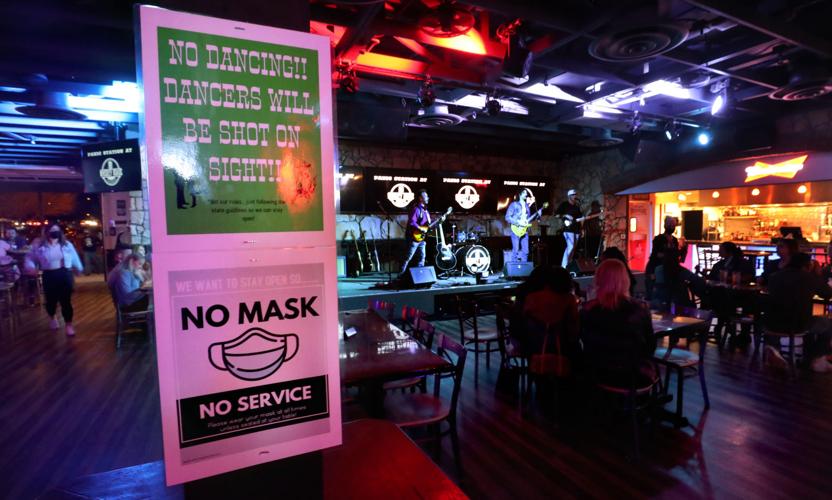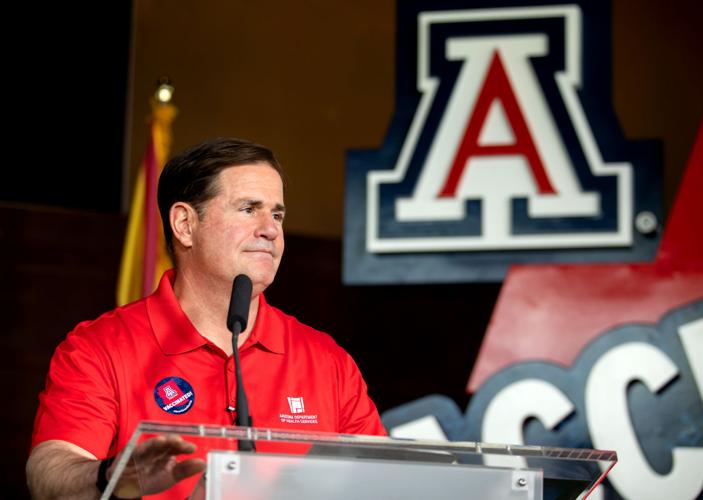PHOENIX — Declaring the COVID-19 pandemic under control and the need for restrictions over in Arizona, Gov. Doug Ducey is abolishing all the limits that still remain on businesses and public gatherings.
And he is eliminating — and once again nullifying — the ability of Tucson, Pima County and other local communities in the state to maintain their own mask mandates.
Gov. Doug Ducey visited the COVID-19 vaccination site at the University of Arizona Wednesday and answered questions from the media about the state's vaccine distribution, its feud with Pima County over a federally run vaccine pod, border issues and more.
Tucson Mayor Regina Romero, however, said the city will not comply, essentially telling Ducey that he will have to go to court to void Tucson’s mask ordinance.
In a new executive order Thursday, Ducey dissolved all the limits he had previously imposed on how businesses need to operate. That eliminates any remaining requirements to limit the number of customers to ensure social distancing and to require that staff and patrons wear masks.
Instead, everything that used to be a mandate is now simply a “recommendation.” That means business can — but are not required — to have their own mask mandates and to refuse service to anyone who does not comply.
That also means that all the music venues and bars that have been shuttered are free to open their doors again. And here, too, while there is a suggestion to maintain social distancing and masks, that is no longer a requirement.
Not “going to switch on the lights”
Ducey’s order, though, doesn’t mean you’ll see downtown Tucson’s Rialto Theatre booking concerts, said Kip Volpe, president of the nonprofit Rialto Foundation Board of Directors that runs the theater.
“We’re still at the mercy at the bands themselves, and if they don’t feel comfortable touring or if they don’t feel comfortable until September or October touring, it’s going to be here or there,” he said. “It’s not like we’re going to switch on the lights and have 200 shows this year.”
Volpe said the Rialto’s upcoming Gallery Project, an exhibit of the concert photos taken by its house photographers C. Elliott and Mark A. Martinez since the early 2000s, will be a test for how comfortable people are in returning to the theater at 318 E. Congress St. The exhibit officially opens April 2, but the soft opening this weekend is nearly full, he said.
“We’re going to get a good idea how comfortable people are,” he said.
The Rialto at this point anticipates reopening in late summer or early fall once it has received funding from the federal Shuttered Venue Operators.
Similarly, Si Charro President Ray Flores said he will take his lead from his customers and staff when it comes to increasing capacity at his family’s eight restaurants including the flagship El Charro Café at 311 N. Court Ave. downtown and the newest restaurant, Barrio Charro at 3699 N. Campbell Ave.
“I think what we are going to do is base it on the level of comfort for our guests and our own crew members,” said Flores, who has worked with city and county officials throughout the pandemic on behalf of Tucson restaurants. “It’s unlikely that we will go to 100% capacity and overwhelm our dining rooms.”
Flores, who has installed filtration systems in his restaurants and has expanded outdoor patio dining, said he is taking his cues from county and city health officials.
“But we appreciate the governor looking out for businesses and hope we can move forward,” he said.
Statewide drop in COVID-19 cases
In issuing the new order, Ducey acknowledged that there have been nearly 940,000 cases of COVID-19 in the state, including 16,874 deaths. But he also cited the fact that the number of new cases has been declining for 10 weeks and hospitalizations are at their lowest level since the end of September.
At the same time, he said, more than 1.9 million Arizonans have received at least one dose of the vaccine, with almost 1.2 million who are now fully inoculated. And he said the Centers for Disease Control ranks Arizona as among the best states in getting the vaccine to those who are most vulnerable.
All that, he said, leads to Thursday’s order.
“The measures put in place last summer allowed Arizona to fight back COVID-19,” the governor said in a prepared statement. “Today, we are in a different spot, and we also are a lot smarter.”
None of this affects schools, which have been reopening with requirements for teachers and students to wear masks. A spokesman for the Department of Health Services said those orders remain in effect.
That pleased state schools chief Kathy Hoffman.
“Masking is one of the top mitigation strategies for safe in-person learning as recommended by the Centers for Disease Control and Prevention,” she said in a prepared statement. But Hoffman was clearly less impressed than Ducey with the number of Arizonans who already have been inoculated.
“With only 1 in 4 Arizonans vaccinated, I encourage everyone to continue wearing a mask when in public spaces,” she said.
“Spiking the ball on the 5-yard line”
The decision to override local control received the predictable angry response from the mayors of the state’s two largest cities.
Phoenix Mayor Kate Gallego said Ducey ignores the fact that the surge in June was curbed only when the governor relaxed his own opposition to masks and agreed to let communities impose their own mandates, many of which did.
“To abandon precautions now is like spiking the ball on the 5-yard line,” she said in a prepared statement, pointing out the new variants of the virus.
“The risk of another surge is real,” Gallego continued. “The governor clearly cares a lot less about the people of Arizona than his political future.”
In Tucson, the governor’s move could lead to more than talk.
“Our city attorney has advised me that we have clear local authority to continue implementing our city mask mandate,” Romero said. “I have no intention of removing our local mask-wearing requirement.”
That would force Ducey to file suit to override the Tucson ordinance.
This isn’t the first time litigation has been discussed. In fact, it was only after Romero threatened legal action last year that Ducey relented and agreed to permit local options.
In her statement, Romero, like Hoffman, pointed out that the vast majority of Arizonans remain unvaccinated and that there are “more contagious, lethal variants” that remain.
“It is unfortunate that Gov. Ducey is caving to political pressure from the far right and hopping on the bandwagon of reckless actions of other governors instead of following the science and doing what’s best for Arizonans,” she said.
The new order does not strip cities of all of their rights. They maintain the ability to require the use of masks in public buildings and on public transit.
Ducey keeping emergency power
Ducey’s decision to lift restrictions comes as state lawmakers, many frustrated with the limits the governor imposed on individual activity are moving to exercise their right to terminate the emergency entirely or, at the very least, amend the Arizona Constitution to limit how long future governors can impose emergency declarations without legislative approval.
Those restrictions at one time even included a stay-at-home order, and the closure of all businesses he said were not essential.
Yet while Ducey is lifting all the restrictions, he is not ending the emergency he declared slightly more than a year ago. That gives him the right to reimpose any of the restrictions any time he wants.
What that also does is preserve what he contends is his right to preclude cities, towns and counties from imposing their own more restrictive requirements.
Keeping the emergency order active also ensures continued flow of federal dollars for things like free vaccines and testing. And it keeps in place an order shielding certain medical workers from lawsuits for mistakes made in diagnosing and treating COVID-19 victims.
While businesses will no longer be at risk of being cited or shut down for not enforcing distancing and mask-wearing, Ducey said he is confident people “will continue to practice the fundamentals and act responsibly as we gradually get back to normal.”
In fact, the state health department clearly does not believe it is advisable for people and businesses to go back to life as it was before.
Hours after the governor issued his executive order, the agency put out its own recommendations.
For individuals, the health department still advises that people should wear masks when they go out to restaurants, bars and nightclubs. There also are the usual recommendations to wash hands often, especially after leaving, and, when possible, to use “touchless” payment methods.
The health department also wants — but can no longer require — businesses to provide physical separation between unrelated parties, whether by a barrier like plexiglass or 6-foot distance and to limit large parties to no more than 10.
Salad bars and buffets also are again allowed, though the agency asks that these be limited.
And while dancing is no longer off limits, the agency wants to “encourage” those who get out on the floor to remain at least 6 feet apart.




